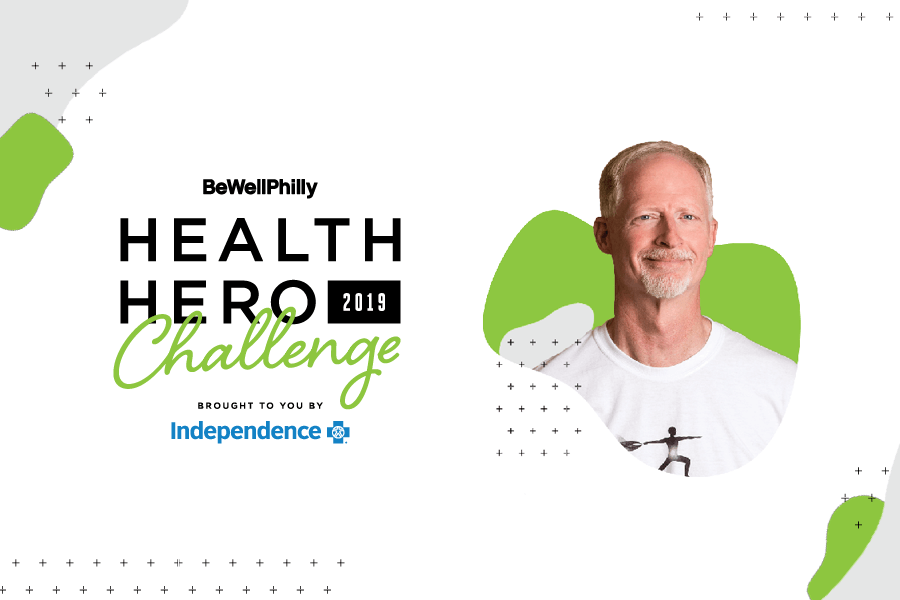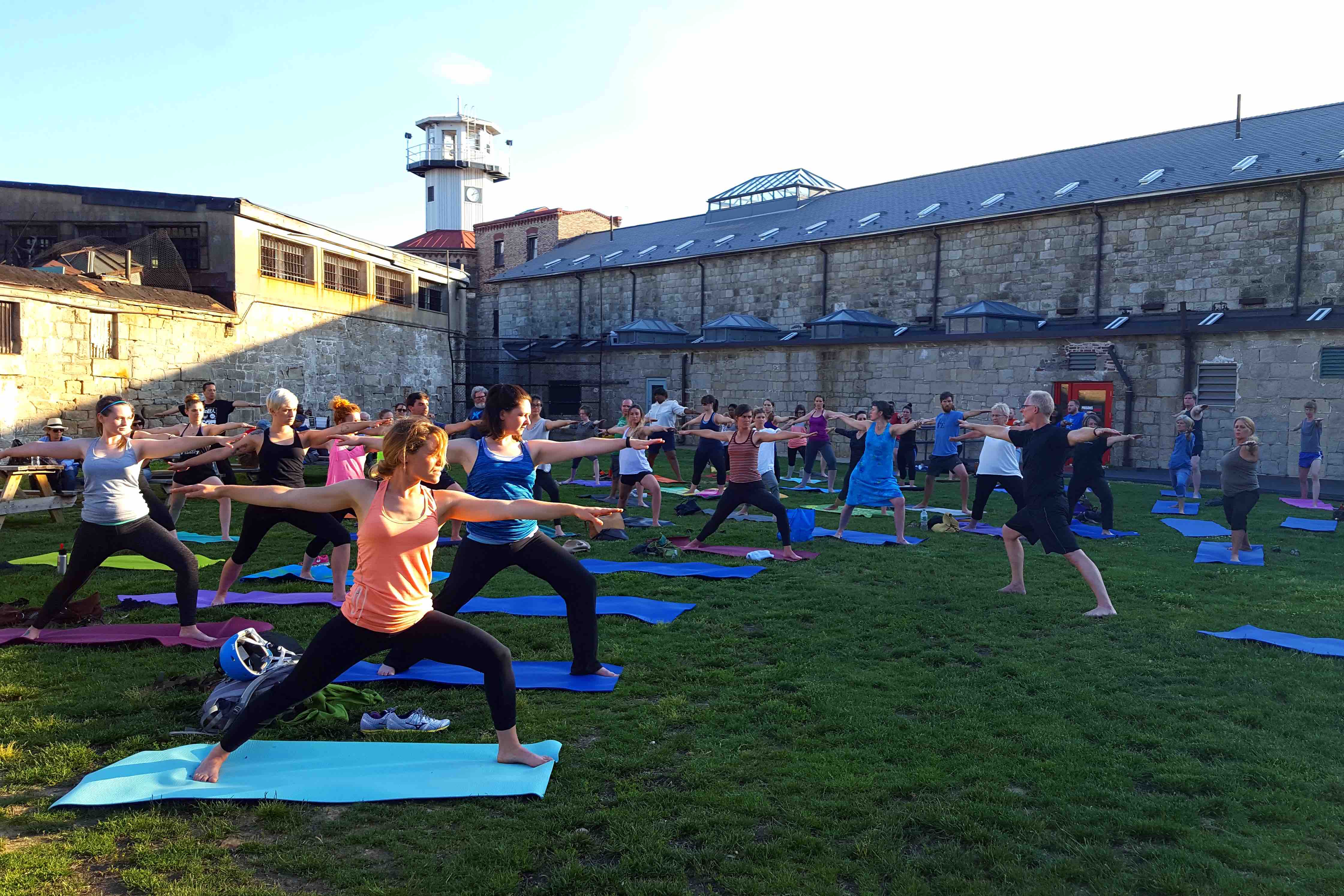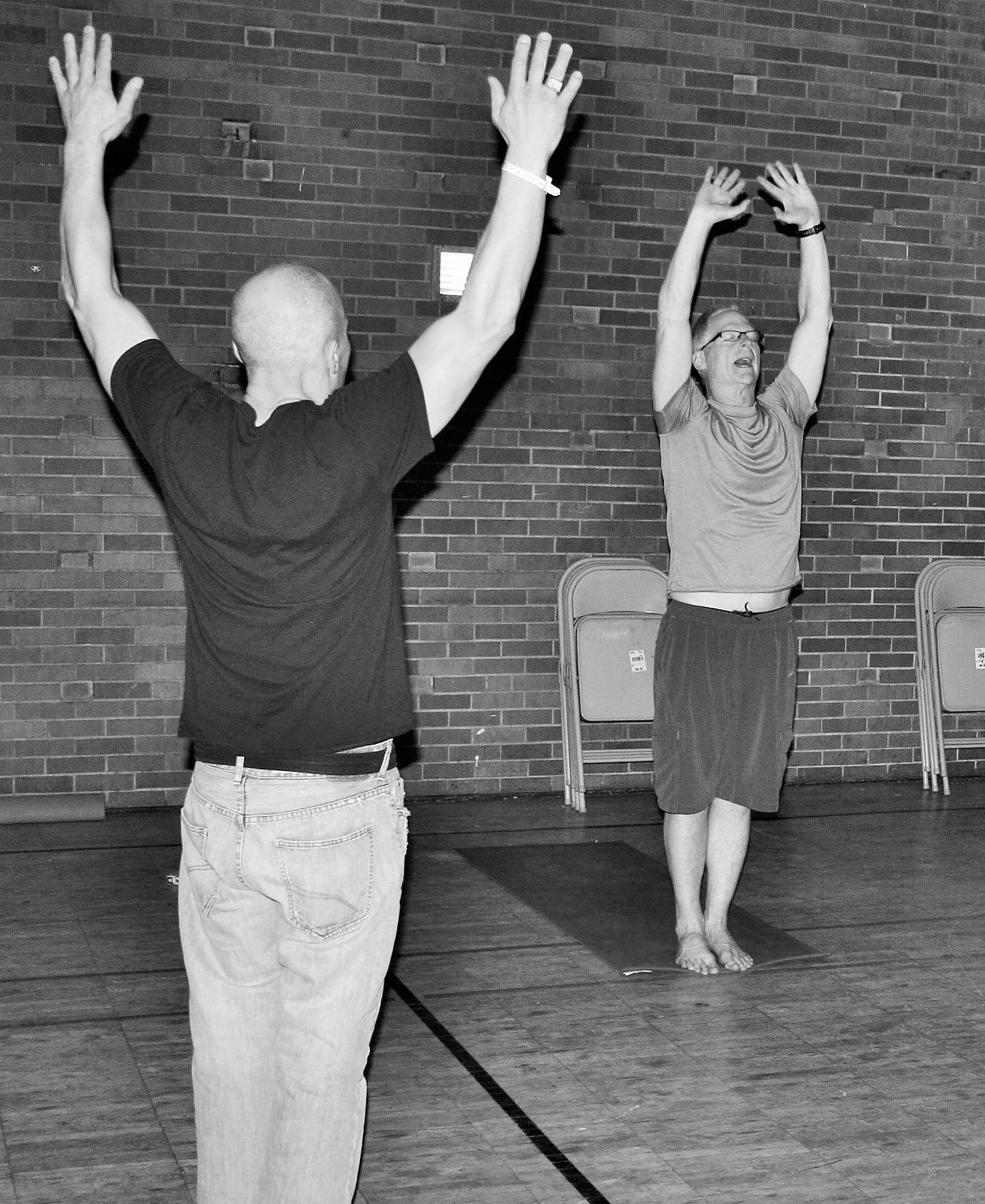Trauma-Informed Yoga Kept This Pennsylvania Man Sane in Prison
Thanks to the Transformation Yoga Project, Michael Huggins is now bringing the practice to others facing difficult circumstances.

Michael Huggins has brought trauma-informed yoga to prisons and addiction recovery facilities. / Graphic by Meredith Getzfread
Over the next few weeks, we’ll be chatting with our semifinalists in the 2019 Be Well Philly Health Hero Challenge to give you a glimpse of the people who are helping Philadelphians live healthier lives. Vote once a day, every day, to help decide which of these 10 semifinalists become one of three finalists — and get a sizable donation to a charity of their choice — here.
Name: Michael Huggins
Role: Founder of the Transformation Yoga Project, a nonprofit that serves people impacted by trauma, addiction and incarceration through trauma-sensitive, mindfulness-based yoga.
***
Why is your selected charity meaningful to you?
In 2009, as chief operating officer of a company embroiled in a medical device investigation, I pleaded guilty to a misdemeanor under the responsible corporate officer doctrine. This doctrine holds executives accountable for actions taken at lower levels of their organizations. In 2011, I, along with three fellow executives, was sentenced to nine months in prison.
As I marked the slow passage of time within Lewisburg Federal Prison Camp, I struggled to cope mentally, physically, and emotionally. However, the yoga I had practiced and taught some years before became my salvation. With this new understanding of the power of mindfulness-based yoga, I began a grassroots effort that evolved into a comprehensive, trauma-informed yoga program within the prison.
This yoga practice offered us many benefits, including impulse control and coping mechanisms for anger, antisocial behavior, and substance abuse problems commonly reported among incarcerated populations. Most of these men, including me, had been dealing with the impact of unresolved trauma, which manifested in violence, anger, frustration, shame, and, ultimately, the idea that, ‘we are not good enough.’ Through yoga, they worked to repair broken relationships, develop a sense of empathy, and to become less hard on themselves.
Upon my release in 2012, I founded the Transformation Yoga Project (TYP) to bring yoga to additional people facing difficult circumstances. This mission drives me to expand access to these impactful tools for dealing with stress, tension, addiction, and anxiety for people — those in addiction recovery facilities and prison hospitals, for instance — who would not otherwise be exposed to them. It was yoga that had kept me afloat and kept me sane during my personal struggles, and I feel a moral obligation to pay it forward and throw that life preserver to others who are struggling.

Photograph courtesy of Michael Huggins
What motivates you to try and make Philadelphia a healthier place?
I once viewed health as a physical endeavor: going to the gym and eating healthy — as long as it fit into my schedule. However, my unexpected journey, one that took me from COO to yoga teacher to incarceration to community leader, was an awakening of what “health” really is. True health is a lifestyle that integrates the mind, body and, for many, spirituality. True health connects the brain with the heart such that we can trust our intuition when something doesn’t “feel” right, including engaging in destructive behavior. There is an urgent need for restoring health in a tangible, practical way, which transcends ethnic, religious, or economic backgrounds in our community. When I see the life-transforming results that yoga and mindfulness create for individuals dealing with trauma, substance abuse, incarceration, PTSD and other challenges, I’m inspired to dedicate my life’s work to helping empower Philadelphians and the Philadelphia community to achieve better health through a true body/mind connection.
Describe a health- or fitness-related turning point in your life.
Although physically active my entire life, I developed chronic back problems while climbing the corporate ladder. I tried everything to alleviate the pain and was headed toward surgery. In 2003, a friend suggested I try yoga for relief. There was something special about that first class, and I have been consistently practicing ever since. As my practice deepened, I found not only relief of back pain but also a renewed sense of purpose in my life. I began to appreciate the potential of the human spirit in myself and others. This practice provided a lifeline during my incarceration where I shared this experience with other men and saw firsthand the transformational impact of yoga, even in a place with little hope or joy.
What “policy” would you institute to make greater Philadelphia a healthier region?
I’d like to see these practical tools for health made more accessible. We at YTP have had amazing success working with people dealing with substance abuse. For example, we’ve partnered with the Delaware County Court of Common Pleas “Second Chance Court” program, which allows women to work on recovery from addiction without going to prison. I’d love to see this model expanded across greater Philadelphia and to include men. But that would just the tip of the iceberg. Veterans dealing with PTSD, individuals with eating disorders, youth dealing with traumatic family situations can all benefit when they have access to the tools and support necessary to discover their own capacities for healing and improving their overall physical, mental, and emotional well-being.

Photograph courtesy of Michael Huggins
What’s the most important part of your health or wellness regimen?
I consider yoga to be a lifestyle rather than a health regimen as it provides the fortitude and resiliency to deal with challenging life circumstances. How we deal with our emotions when under stress directly impacts our health, whether it is the choice of foods we eat, the physical activities taken to care for our bodies, or the methods used to quiet the mind when surrounded by chaos. Yoga also allows us to be less judgmental of ourselves and to forgive ourselves when we make poor health decisions, which allows us to recover more easily and get back on track.
What is your number one piece of health-related advice/encouragement?
Where you are on your health journey today does not define who you are or who you can become. One of our students was recently released after a 20-year prison sentence. While incarcerated, this student became a certified yoga instructor through the Transformation Yoga Project, leading multiple classes within the prison. He’s now using these skills to navigate the challenging re-entry process. We possess the capacity to transcend burdens, move out of our comfort zone, and move beyond misconceptions that hold us back from living our healthiest, most authentic life. When we discover and honor who we are at our core, then health-related issues ease.


